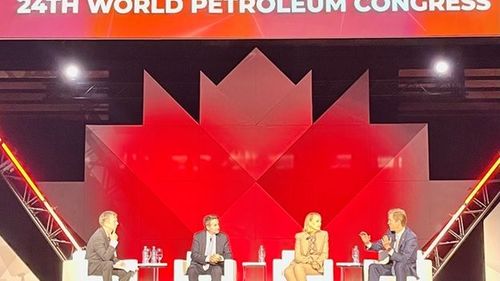WestJet endorses widescale Canadian production of SAF

CEO Alexis von Hoensbroech attends 24th World Petroleum Congress. From left: Paul Hickin, Editor-in-Chief, Petroleum Economist, Josu Jon Imaz, CEO, Repsol, Julie Sweet, Chair & CEO, Accenture and Alexis von Hoensbroech, CEO, WestJet Group.
September 20, 2023
BY WestJet
WestJet Group Chief Executive Officer Alexis von Hoensbroech, on Sept. 19 at the World Petroleum Congress in Calgary, addressed the airline’s ambitions to achieve net-zero emissions by 2050 and the vital role sustainable aviation fuel (SAF) plays in the future of decarbonizing aviation. With no current technological alternative for large commercial aircraft propulsion, airline reliance on sustainable jet fuel will be foundational to the decarbonization of the aviation industry. With its abundant space to grow feedstock, a large oil and gas industry and robust federal sustainability goals, Canada holds the necessities to facilitate the large-scale production of SAF.
“Air travel is essential to Canadians and critical to the nation’s economy; with the right regulatory environment and collaborative efforts of producers and airlines, Canada has an enormous opportunity to further its global leadership in energy sustainability through SAF production,” said Alexis von Hoensbroech, WestJet Group CEO. “The time is now for a regulatory framework to create a competitive investment climate for sustainable aviation fuel production, right here in Canada, that keeps air travel affordable and accessible.”
SAF is the most effective way to reduce the carbon footprint of air travel, with potential to almost entirely eliminate net greenhouse gas emissions compared to fossil jet fuel. SAF can be blended with conventional jet fuel to meet all certification and safety requirements, making it a model solution to reduce greenhouse gasses from air travel, while requiring no new investments in aircraft engines, fuel infrastructure or distribution processes.
“The most direct path to achieve our target of net-zero emissions by 2050 hinges on the future of SAF production,” continued von Hoensbroech. “Access to SAF continues to be constrained by high costs, which can be as much as three to five times that of jet fuel. To date, not a single drop of SAF has been produced in Canada. We believe the best path forward to making SAF the low carbon fuel standard, is collaboration between airlines, producers and policy makers.”
Advertisement
Advertisement
Advertisement
Advertisement
Related Stories
Bangkok Airways Public Company Limited has officially announced the adoption of sustainable aviation fuel (SAF) on its commercial flights, reinforcing Thailand’s green aviation industry. The initiative took effect starting July 1, 2025.
Avalon Energy Group LLC and Sulzer Chemtech have signed a strategic alliance and partnership agreement to scale up the production of SAF. Under the agreement, Avalon has selected BioFlux technology for its portfolio of SAF projects.
Neste and DHL Express have strengthened their collaboration with the supply of 7,400 tons (9.5 million liters) of neat, i.e. unblended, Neste MY Sustainable Aviation Fuel to DHL Express at Singapore Changi Airport starting July 2025.
The U.S. Energy Information Administration maintained its forecast for 2025 and 2026 biodiesel, renewable diesel and sustainable aviation fuel (SAF) production in its latest Short-Term Energy Outlook, released July 8.
XCF Global Inc. on July 10 shared its strategic plan to invest close to $1 billion in developing a network of SAF production facilities, expanding its U.S. footprint, and advancing its international growth strategy.
Upcoming Events










